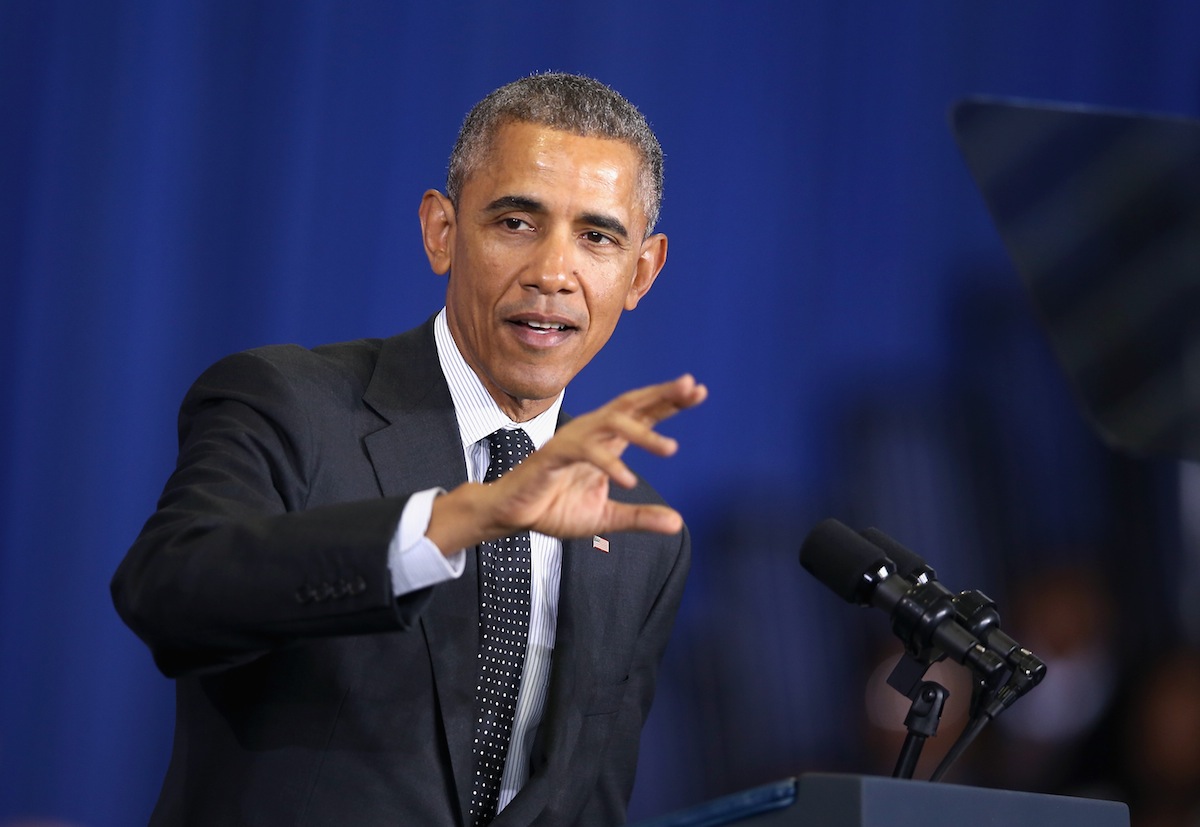
Correction appended, Feb. 24, 2015, 10:45 a.m.
For nine months, trade in the Pacific has been stalled. Ships languished at docks, their cargo stuck, lost profits ticking up into the millions, as negotiations between the International Longshore & Warehouse Union (ILWU) and their employers, the Pacific Maritime Association (PMA), dragged on. But the tide may be turning: the dockworkers’ union and the PMA announced that they have reached a tentative agreement on their next contract—and the repercussions reach far beyond the West Coast ports at the heart of the negotiations. This conflict between workers and employers goes to the heart of the crisis of inequality facing the American economy today.
President Obama repeatedly has claimed one of his top priorities is supporting middle class families. And, though he hasn’t articulated the comparison himself, this latest news shows that one of his strategies for doing so takes a page from history—namely from Franklin D. Roosevelt. Almost exactly 80 years ago, Roosevelt helped resolve a dispute not unlike the current ILWU-PMA showdown, and, in doing so, helped tens of thousands of working people and their families.
In 1934, militant longshoremen rose up and declared the “Big Strike,” shutting down every West Coast port. Workers demanded decent wages and workplace improvements, but employers called upon their allies in government to break the strike—most notoriously when San Francisco police killed two strikers and wounded dozens on “Bloody Thursday.” This remains an official holiday for ILWU members even today.
Employers did not listen to the cries of their own workers but President Roosevelt did. In a shocking break from precedent, he sent a trusted aide, Secretary of Labor Frances Perkins—the first woman ever to serve in a presidential cabinet—to mediate negotiations between workers and their bosses.
With Perkins’ assistance, the strikers won an astounding series of concessions: a union-controlled hiring hall, which ended discrimination and favoritism in hiring; a coastwide contract with all workers receiving the same wages and conditions; and a better hourly wage.
Shortly thereafter, working with a sympathetic Congress, FDR made unions, strikes and collective bargaining legal. He also helped abolish child labor, establish a minimum wage, the 8-hour day and overtime rates. In 1936, he explained why he sided with working people over corporations: “The test of our progress is not whether we add more to the abundance of those who have much, it is whether we provide enough for those who have little.”
Due to unions like the ILWU and public officials like Roosevelt and Perkins, the American middle class grew to a previously unimaginable size. Collectively bargained pay-raises in union workplaces lifted wages in non-unionized ones, too, because employers competed for workers. Not coincidentally, the so-called Greatest Generation also was the most heavily unionized generation in U.S. history.
In recent decades, however, that trend has reversed. Unions and the middle class are both weaker than they once were. Enter the ILWU-PMA impasse. During the past month, the PMA had begun rolling lockouts and blamed the union for work slow-downs. Business associations and retailers called for an end to West Coast port congestion and for the destruction of one of America’s last strong unions.
Given the relative weakness of support for unions today, President Obama found himself in the same situation FDR faced. The easy choice would be to side against the union, intervening to break the impasse, if at all. Some corporate executives and anti-union politicians called for Congress to change labor law to permanently weaken the ILWU or for Obama to invoke an anti-union “cooling off” provision of the Taft-Hartley Act (as President George W. Bush did in 2002 during previous ILWU-PMA negotiations).
But when President Obama finally acted, it was to make the choice Roosevelt also made about a century prior. He dispatched his Secretary of Labor, Tom Perez, who traveled to San Francisco to meet with ILWU and PMA officials. The result is an agreement that could put both laborers and business back to work, though the details of the deal remain secret and, given the union’s democratic process, subject to a vote by the 20,000 members of its longshore division.
The timing of Obama’s intervention is apt. This past Thursday, Obama announced a new national monument, in Chicago’s Pullman neighborhood, to honor workers. Pullman was the birthplace of an important labor union of (mostly African American) sleeping car porters—but was also ground zero for a mammoth railroad strike that rocked American in its First Gilded Age.
As Obama noted in his announcement, the Brotherhood of Sleeping Car Porters dramatically benefited its members and their families by helping them enter the middle class. Crucially, unionism also facilitated racial equality by sufficiently empowering black citizens to be able to demand equal treatment.
Perhaps more surprisingly, four Illinois Republicans—one Senator and three Congressmen—endorsed the Pullman designation. In their letter to the president, they also insisted that the porters union “laid the groundwork for the Civil Rights movement.” Furthermore, they recognized that the mammoth Pullman strike in 1894 “provided workers across America with a blueprint for how to achieve a better working environment and secure fair wages and rights in the workplace.”
These statements from Obama and the Illinois Republicans would likely appeal to Roosevelt—but FDR, the best president American working people have ever had, would take even more comfort from what’s happened with the longshoremen. Eight decades after an earlier West Coast longshore dispute, the president has taken an opportunity to demonstrate—rather than merely declare—that the government serves the people rather than the interests of those FDR called “economic royalists.”
Correction: An earlier version of this article misstated how many years ago FDR intervened in the longshoremen’s strike. It was 81. That version also incorrectly referred to the ILWU situation as a strike. It was an impasse in negotiations.

Historians explain how the past informs the present
Peter Cole is a Professor of History at Western Illinois University. He is the author of Wobblies on the Waterfront: Interracial Unionism on the Progressive Era Philadelphia. His current book project is entitled Dockworker Power: Struggles in Durban and the San Francisco Bay Area.
More Must-Reads from TIME
- Donald Trump Is TIME's 2024 Person of the Year
- Why We Chose Trump as Person of the Year
- Is Intermittent Fasting Good or Bad for You?
- The 100 Must-Read Books of 2024
- The 20 Best Christmas TV Episodes
- Column: If Optimism Feels Ridiculous Now, Try Hope
- The Future of Climate Action Is Trade Policy
- Merle Bombardieri Is Helping People Make the Baby Decision
Contact us at letters@time.com